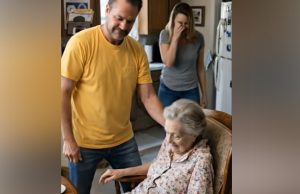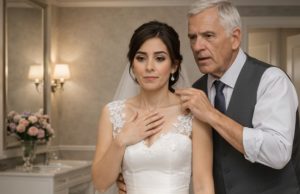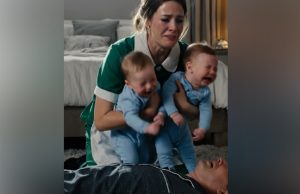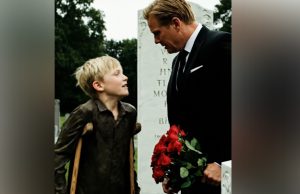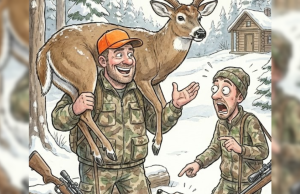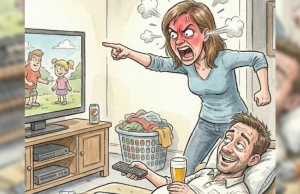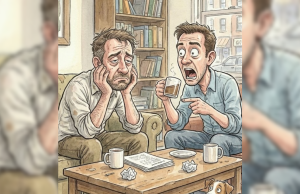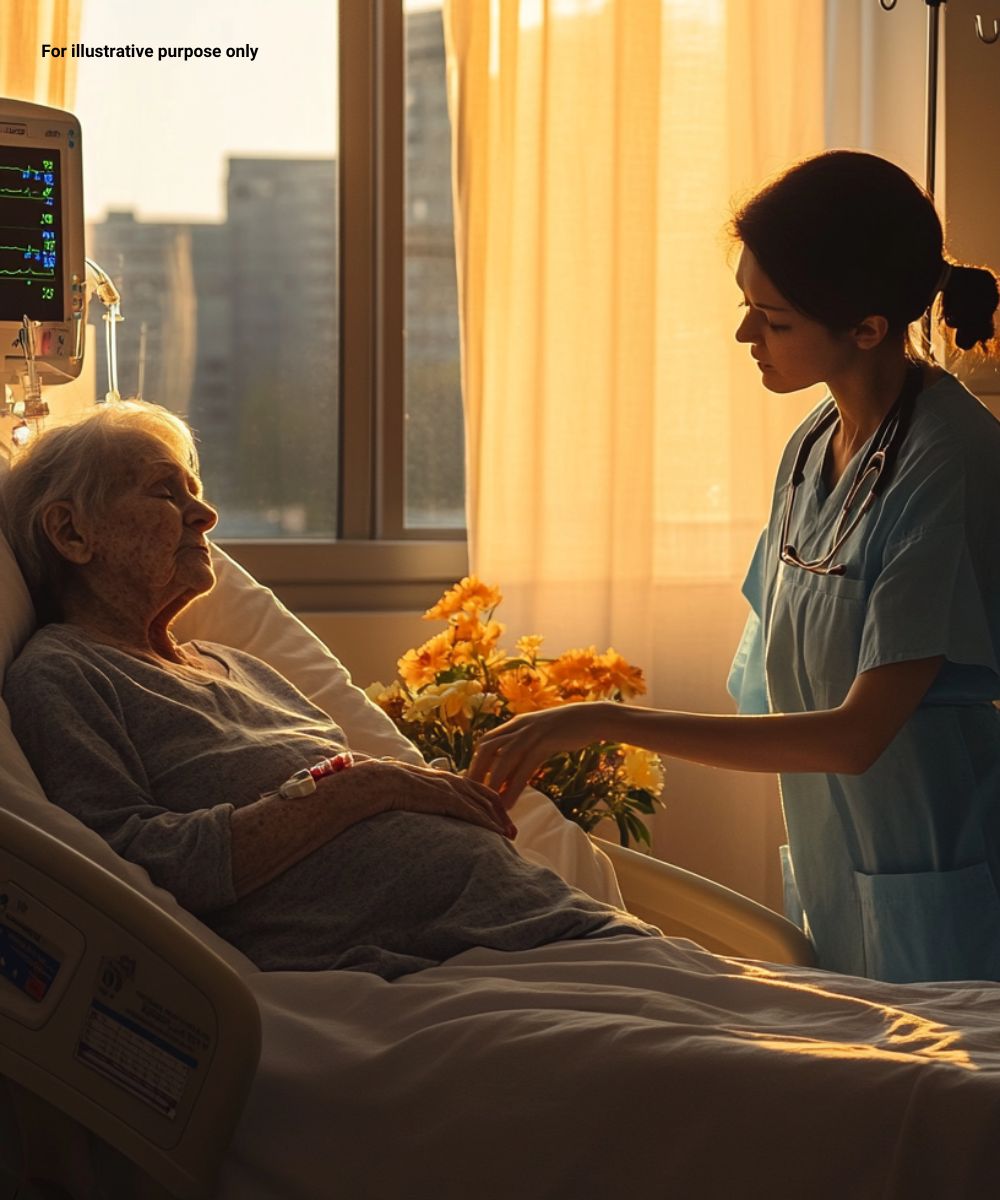
The monitor flatlined at 3:42 p.m. on a Tuesday—not with a dramatic movie beep, but a low, continuous hum that stretched into forever.
I didn’t move, my hands still clasping Rachel’s cooling fingers, realizing I was now the only living soul in the room. My mother-in-law had just exhaled her final breath, and I was completely alone.
“Mrs. Emerson, are you okay?” A nurse appeared at the door, her clipboard hugged to her chest. Her eyes bore the weary compassion of someone familiar with death, but not yet hardened by it.
I nodded stiffly, my throat constricted. Life thrived behind her—doctors were embraced by relieved families, kids clutched “Get Well Soon” balloons, elderly couples held hands in waiting chairs. But I stood wrapped in silence no one dared to disturb.
“I called them again,” I said, my voice so small it barely registered. “My husband and his sister. They said they’d come.”
Her gaze softened. She’d seen me on the same bench for three days straight. She’d heard me leave the voicemails, send the unanswered texts, and look up in vain every time footsteps echoed.
“Some people can’t handle goodbyes,” she offered gently. But we both knew that wasn’t it. This wasn’t inability—it was choice. Through the wall, I heard celebration. A new mother going home. The contrast pressed on my chest like weight.
“I should call the funeral home,” I murmured, reaching for my phone. Three missed calls from work. None from David or Karen.
“The doctor will sign the papers first,” the nurse said, nudging me into the chair I’d barely left. “Also—Rachel left this for you.”
From her pocket, she pulled out an envelope, the edges worn. My name was scrawled in Rachel’s spidery script. “She told me to give this to you only after she passed,” the nurse said. “She was very adamant.”
My hands shook as I took it. In the five years I’d been married to David, Rachel had been cordial but distant. What could she want to say now?
I opened it carefully. Inside, a rusted key was taped above an address I didn’t recognize—and a single, chilling line.
They never loved me. Now they’ll learn what it means to be left behind.
“Everything okay?” the nurse asked, seeing my face.
“Yes,” I lied. “Just some parting words.”
I signed the forms and gathered Rachel’s sparse belongings: a worn robe, old glasses, a novel she never finished. Outside, the sun was too bright. In the parking lot, families loaded into cars, carrying flowers or babies. Normal life continued. Mine stood still.
I sat in my car twenty minutes before turning the ignition. My mind looped Rachel’s final weeks: her distance, her quiet comments, the way she watched me when she thought I wasn’t looking. Like she was deciding something.
The drive home blurred. At a red light, I checked my phone. Still no word. At home, I was hanging up my coat when David finally called. His name flashed across the screen. I felt equal parts relief and fury.
“Hey,” he said casually. “You heading home soon? We’re out of groceries.”
I clutched the counter. “Rachel di:ed today.”
Silence. Then: “Oh. When?”
“3:42,” I said. “You’d know if you picked up your phone.”
A pause. “Had meetings all day. You know how it goes.” Then: “She was never easy.”
I hung up. The house felt soulless. Bills sat on the table like ghosts of normalcy. Rachel’s note, hot in my palm, felt like a brand.
That night, I didn’t sleep. David came home late, crawled into bed silently, and left before sunrise. I lay awake, the key pressed into my hand. By 7 a.m., I had made my decision. I dressed and entered the address into my GPS.
It led me thirty miles out, down rural roads, until I reached a gravel driveway hidden behind wild shrubs. A crooked gate sagged open, revealing a weather-beaten cottage. Roses overtook one wall, thorny branches scraping old windows.
The key turned smoothly. The door creaked open into a home untouched by time. Dust floated through sunbeams. Books lined shelves. Old albums waited on a table. And in the center, another envelope: To be opened upon my death by my attorney.
I stepped inside and shut the door. The air smelled of lavender and time. I realized this was Rachel’s true home. Not the sterile nursing facility David insisted she live in—but where her spirit remained. And somehow, she’d chosen to share it with me.
At the table, I stared at the envelope. The name read Charlotte Reed, Esq.—an office downtown. I found the number and called.
“Reed & Associates,” came a crisp voice.
“My name is Lauren Emerson. My mother-in-law, Rachel Emerson, passed yesterday. She left an envelope addressed to you.”
A beat of silence. “Yes, Ms. Emerson. I’ve been expecting your call. I’m sorry for your loss.” Her tone warmed. “Rachel was… extraordinary. Can you come tomorrow morning?”
“Yes. Should I bring the envelope?”
“Absolutely. And… Ms. Emerson, Rachel requested all named beneficiaries be present. That includes David and Karen.”
My stomach clenched. “They must be there in person?”
“She was very clear on that.”
That night, I returned to find David watching football. “Where were you?” he asked.
I stared at him. “Handling your mother’s death, since no one else showed up.”
He muted the TV. “Don’t guilt trip me. She and I had history.”
“Her lawyer called. We need to meet tomorrow. You and Karen.”
He sighed. “Fine. I’ll tell her.”
The next morning, David drove us downtown. Karen met us outside, smoking. “This is a joke,” she muttered. “I had to skip work for this?”
Inside, Charlotte Reed’s office was neat and bright. Two elderly women I vaguely recognized from Rachel’s church sat inside—Judith and Marie.
“Thank you for coming,” Charlotte began. “This is the last will of Rachel Anne Emerson, revised two months ago.”
David checked his phone. Karen scowled.
“To my son, David Emerson,” Charlotte read, “I leave my forgiveness, though it was never earned.”
The room froze.
“To my daughter, Karen Emerson, I leave my wedding band. May it remind you that commitments are sacred.”
Karen’s face turned crimson.
“To my friends Judith White and Marie Allen, I leave $5,000 each, for their friendship.”
They looked stunned.
“And to my daughter-in-law, Lauren Emerson, I leave my entire remaining estate: the property at 92 Maple Hollow, all financial assets, and personal effects.”
Stunned silence.
Karen exploded. “What?! She barely knew her!”
David jumped up. “This is insane! Lauren manipulated her!”
Charlotte remained calm. “There is no error. Rachel was of sound mind. Here is the evaluation and a video statement she made.”
David paled. “How much are we talking?”
Charlotte looked at me. “The house is valued around $300,000. Investments and policies total about $420,000.”
After David and Karen stormed out, Charlotte handed me another envelope. “She said this was for after the reading.”
Alone, I opened it. One line.
Forgive no one. Let them beg. Let them kneel. Then walk away.
Charlotte met my eyes. “She trusted you. She gave you her voice.”
I understood. Rachel hadn’t just left me things—she left me power. A mission.
Back at home, I told David I was staying at the cottage.
He changed instantly. “Sure, babe. Whatever you need.”
It made my skin crawl.
At the cottage, I found Rachel’s journals. They revealed a sharp, lonely woman. She’d documented everything. David’s debts. Karen’s neglect.
Made a turkey. Set four places. No one came. Karen sent a text. David didn’t even call.
Days later, Karen sued, claiming undue influence.
“I expected this,” Charlotte said. “We’re ready.”
In court, Rachel’s recordings eviscerated their case. The judge dismissed the claim, charging Karen with court costs.
That night, David waited, drunk and bitter. “She turned on me from the grave!”
“No,” I said. “She just needed someone to see it.”
“You manipulated her.”
“No. I witnessed her pain.”
“I did everything for you!” he shouted.
I walked past him. “I’m moving out. We’ll speak through attorneys.”
He blinked. “You’re serious?”
Dead serious. Holly’s words echoed. Forgive no one.
Weeks later, he came begging. “Just a loan. Five grand. I’m in a hole.”
I shook my head. “She left nothing for you. I’m respecting that.”
“You’re cruel,” he spat.
“No. I’m done enabling.”
Then came Karen, slurring into my voicemail. I hit delete.
Spring arrived. I renovated the cottage. Painted it warm, welcoming. I placed a carved sign above the door: Rachel’s Refuge.
With Charlotte’s help, I launched a nonprofit. Support groups. Grief dinners. A place where no one would be forgotten.
On what would’ve been Rachel’s 75th birthday, we unveiled a mural of her and her late husband, laughing under an oak. The paper covered the story.
I spoke at conferences on elder care. I wrote a book: The Letter That Freed Me.
David remarried and moved to Nevada. Karen waitressed overnight shifts.
I never responded. I had learned Rachel’s final lesson: Smile. Turn. Walk away.
At the base of the old oak, I left a bouquet. “You were never forgotten,” I whispered. “And now, neither am I.”
The breeze stirred, and for the first time, I felt peace—not because of what I’d gained, but what I’d built.
Rachel’s legacy wasn’t money. It was strength. And from it, something beautiful had grown


